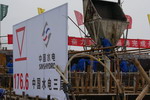Emission rules on power plants get tougher
Updated: 2011-09-22 09:50
By Li Jing (China Daily)
|
|||||||||||
New restrictions on thermal power plants aim to ensure cleaner air
BEIJING - Thermal power plants will soon operate under tighter emission controls, with mercury output monitored for the first time, under new standards released on Sept 21 to tackle worsening pollution.
The rules, to take effect on Jan 1, 2012, place tougher restrictions on pollutants and will replace standards that were introduced in 2003.
Pollutants targeted include sulfur dioxide, nitrogen oxide and soot, major contributors to acid rain.
For the first time, mercury discharged from coal burning will be under intense scrutiny. The toxic heavy metal hampers neurological development with children and pregnant women most at risk.
About 260 billion yuan ($40.7 billion) needs to be invested on upgrading industrial facilities to meet the standards, the Ministry of Environmental Protection predicted.
Wu Xiaoqing, deputy environment minister, said that the standards will help substantially cut emissions of major airborne pollutants.
By the end of 2010, the country's total electricity generation capacity reached 962 million kW, second highest in the world. About 73 percent comes from thermal power plants that consume 1.6 billion tons of coal annually.
"The thermal power industry has to greatly reduce polluting emissions ... because the environmental capacity is limited," said Wu, adding that the country faces increasing pressure in tackling pollution.
Average air quality in 45 major cities was rated as "poor" in the first half of this year, according to statistics.
"With the new standards, the thermal power industry alone will have to slash 5.8 million tons of nitrogen dioxide and 6.18 million tons of sulfur dioxide by 2015," Wu said.
The new standards will result in a substantial increase in pollution-treatment costs for power plants.
This ignited fierce opposition from electricity companies, Zhou Rong, a climate and energy campaigner with Greenpeace, said.
"But the Ministry of Environmental Protection has been determined to control pollution in the thermal power industry.
"We're pleased to see the result. But if the new standards are to be observed the ministry needs to publish a specific plan of action."
A study by Greenpeace shows that the cost of burning coal has largely been underestimated.
Coal comes at a much higher price if costs caused by "by-products", such as pollution and mining deaths, are taken into account, Zhou said.
"By adopting these standards the government sends out a clear signal that China is dealing with these costs."
It is equally important to reduce coal consumption and switch to clean energy, such as solar and wind power, she said.
Li Zheng, dean of thermal engineering at Tsinghua University, warned that coal consumption was not limited to huge power plants.
Small-scale boilers, such as those used for heating during the winter, should also be targeted.
"Otherwise the effect of the new standards will be watered down."
Related Stories
China's power consumption up 9.1% in Aug 2011-09-15 16:38
China to set stricter emission standards for thermal power plants 2011-08-23 15:04
China to focus on developing biomass, solar power 2011-08-01 13:28
Overcapacity being cut amid power shortages 2011-07-12 10:07
Power plant losses continue to add up 2011-06-22 13:50
- Growth indicators boost stock market
- Funds from foreign exchanges complicate monetary policies
- Power plants face tougher emission rules
- China's cabinet adjusts resource tax rate
- Train crash probe 'needs more time'
- SAMC signs deal with Boeing
- Chicken tariffs ruffle feathers in the US
- IMF cuts China 2011-12 growth estimates













